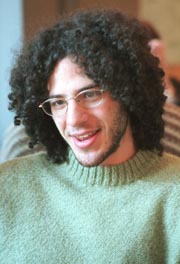
Juda Strawczynski: No starched shirt
According to popular wisdom, business students are supposed to swagger with self confidence, dress to the nines at all times, always at the ready to talk up a storm about their potential for upper-management positions.
It's an unfair stereotype to be sure; still, Juda Strawczynski strays from it more than do many of his contemporaries in the Faculty of Management. With his shining black ringlets, his cozy sweater and nonchalant manner, Strawczynski could pass for a music student.
No selling job going on here. Asked, for instance, how he came to be one of only two students from across the country selected to sit on the 15-member board of the Canada Millennium Scholarship Foundation, he replies: "It was luck, I guess."
Luck, too, that his 93% average made him the Valedictorian of Nepean High School last year -- and that he was named best high school debater in Ontario and that he is a recipient of a prestigious J.W. McConnell Entrance Scholarship? The first-year management student insists he's no brainiac. He's earned his accomplishments the hard way. "I'm one of those people who has to slave over work."
But Strawczynski (pronounced Stroff-chin-ski) is also one who is unafraid to try different things -- go out on a limb -- regardless of whether the idea succeeds. "There's hard work. But then for every few things I try, one of them will end up a winner. It's all part of the learning process."
The reason why Strawczynski is studying management at all has to do with beaver tails. Not the real ones, but the Ottawa version of the donut: flat, deep-fried dough, sprinkled liberally with sugar and cinnamon, and sold in the Byward Market. As a nascent entrepreneur in grade 11, Strawczynski envisioned selling the popular and ultra-Canadian BT in Israel alongside the Canadian-built hockey rink in Matulah.
Ultimately, after doing the market research and the patent check, he figured he was too young and inexperienced for such a venture. He also figured that a business education would provide the "backbone" necessary to support his ideas relating to business and organizations.
"I think business combines the best of arts, taking a bit of everything to put them into a useable form for everyday life." Furthermore, continues the 19-year-old, the McGill program gives its students some freedom in choosing interesting, non-management electives. Film, philosophy and the history of science were Strawczynski's choices this year.
In any case, this young man isn't concerned about what he'll do ultimately with his degree. "The other thing about business," he muses between sips of tea, "is that it could prepare you for journalism, working in NGOs (non-governmental organizations), government or the private sector. It's practical."
Asked to name his favourite books, Strawczynski shies away from business gurus like Tom Peters, and opts instead for Le Petit prince by Antoine de St-Exupéry.
A favourite passage concerns the pleasure children take in riding the train while the adults are "asleep" or "yawning."
"Only the children are flattening their noses against the window-panes," says the switchman.
"Only the children know what they are looking for," replies the little prince.
Strawczynski isn't alone in his appreciation for the innocent wonder of de St-Exupéry's work. (The children's poetry of Canadian Dennis Lee is also close to Strawczynski's heart.) Not long ago, for instance, he noticed a newspaper article mentioning that Jozef Straus, president of the Ottawa-based high-tech company JDS Fitel, advocates that managers read Le Petit prince.
He is optimistic about finding kindred spirits in management. Strawczynski is heartened by the recent announcement of the McGill-McConnell Master of Management program for leaders in the voluntary sector. He only wishes that the case studies used in his International Business class, for instance, would go beyond business corporations. "Why not use Greenpeace instead of Bombardier?" he wonders.
For now, he'll content himself with helping shape his own voluntary sector organization, the Canada Millennium Scholarship Foundation. Strawczynski wants to help ensure that students pursuing an education in the non-technologically oriented disciplines get equal treatment -- he worries that governments' growing preoccupation with the need for technically trained graduates could work against students interested in art or history.
He also wants to use his position to lobby the government to devise a better funding system for post-secondary education. The Millennium Fund is a good idea, but it will only exist for a 10-year period. "It's not a solution in itself."
Bronwyn Chester
| 


